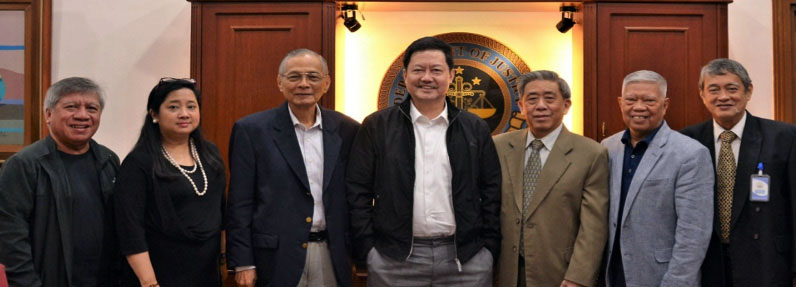
PDRC Chairman Atty. Victor P. Lazatin, President Atty. Edmundo L. Tan, Corporate Secretary Atty. Patricia-Ann T. Prodigalidad, Membership Committee Chair Atty. Victoriano V. Orocio, Trustee Prof. Mario E. Valderrama, and Asst. Secretary General Francisco D. Pabilla, Jr. paid a courtesy visit to Department of Justice Secretary Menardo I. Guevarra on June 11, 2018.
President Tan invited the DOJ Secretary to be the guest of honor and speaker at the PDRC General Membership Meeting on July 3, 2018. Secretary Guevarra accepted the invitation and asked for a copy of the PDRC Annual Report as his reference.
The PDRC delegates briefed the DOJ Secretary on recent developments in ADR in the Philippines, such as the revision of Republic Act 9285 (ADR Act of 2004). PDRC actively participated in the Technical Working Group (TWG) on Arbitration, which completed the initial draft of the chapter on arbitration. However, the work of the TWG on Mediation in drafting the revised chapter on mediation was not finished. The accreditation of PDRC as an ADR service provider has also remained pending with the Office for Alternative Dispute Resolution (OADR), which is under DOJ supervision. The DOJ Secretary promised to call a meeting with the OADR.
Secretary Guevarra was an accredited PDRC arbitrator before he was appointed to several positions in the government beginning in 2015.
Summary judgments in arbitration
PART 2
Note: In Part 1, the author discussed summary judgments in litigation and its application to Philippine arbitration.
Concerns with summary judgment
When a party opposes an application for summary judgment, the adverse award in domestic arbitration may be challenged on the ground of arbitrator misconduct under Section 24(c) of The Arbitration Law, by “refusing to hear evidence pertinent and material to the controversy.” In case of international arbitration, the adverse summary award may be set aside under Article 36 (1)(a) (iv) of the Model Law or Article V (1)(b) and (d) of the New York Convention because the arbitral procedure “was not in accordance with the agreement of the parties.”
Where the award is vacated or set aside, the parties are compelled to return to arbitration, after incurring additional time and cost in litigation. The tribunal is also compelled to resume the arbitration and render a new award, this time giving the objecting party a full opportunity to present its side. The risk of not being compensated for the extra work done—long after the dispute was originally heard—naturally dampens any enthusiasm by the tribunal to issue a summary award without an express rule.
Early dismissal in international arbitration
Almost two years ago on August 1, 2016, the Singapore International Arbitration Centre (SIAC) became the first major arbitration institution to expressly adopt a summary procedure to dismiss an unmeritorious claim or to strike out an unmeritorious defense. The new rule on Early Dismissal of Claims and Defenses is found in Rule 29, which allows a party to apply to the tribunal for the early dismissal of a claim or defense that is (a) manifestly without merit; or (b) manifestly outside the tribunal’s jurisdiction. The application must be supported with detailed facts and the legal basis for early dismissal.
The remedy is similar to the common law procedural remedies of summary judgment and striking out and is limited to clearly unmeritorious claims or defenses or patently outside the tribunal’s jurisdiction. The tribunal retains the discretion to allow the application to proceed and, if allowed, the tribunal will hear the parties and rule on the application, in whole or in part, within 60 days from the application. The award shall be reasoned but may be in summary form.
The SIAC was hailed for taking the bold step of adopting the new rule, which had only a few predecessors like the JAMS Comprehensive Rules or Rule 41.5 of the ICSID Arbitration Rules, and it soon triggered “watchful waiting” commentaries from practitioners and arbitrators. A few months later, the Arbitration Institute of the Stockholm Chamber of Commerce (SCC) released its new Arbitration Rules on January 1, 2017, which included a summary procedure under Article 39.
 Unlike the SIAC’s early dismissal rule, Article 39 of the SCC Rules allows a request for summary procedure concerning “issues of jurisdiction, admissibility or the merits,” which may include, for example, an assertion that: (i) an allegation of fact or law material to the outcome of the case is manifestly unsustainable; (ii) even if the facts alleged by the other party are assumed to be true, no award could be rendered in favour of that party under the applicable law; or (iii) any issue of fact or law material to the outcome of the case is, for any other reason, suitable to determination by way of summary procedure.”
Unlike the SIAC’s early dismissal rule, Article 39 of the SCC Rules allows a request for summary procedure concerning “issues of jurisdiction, admissibility or the merits,” which may include, for example, an assertion that: (i) an allegation of fact or law material to the outcome of the case is manifestly unsustainable; (ii) even if the facts alleged by the other party are assumed to be true, no award could be rendered in favour of that party under the applicable law; or (iii) any issue of fact or law material to the outcome of the case is, for any other reason, suitable to determination by way of summary procedure.”
However, the SCC Rules does not give the tribunal the discretion to allow the application to move forward, although it requires the tribunal to consider, among others, the extent to which the summar y procedure would contribute to “a more efficient and expeditious resolution of the dispute.” It requires the tribunal to give each party “an equal and reasonable opportunity to present its case,” but does not give the tribunal a deadline to issue its order or award on the summary application.
On October 30, 2017, the International Chamber of Commerce (ICC) issued an updated practice note to parties and tribunals, which confirmed that the “expeditious determination of manifestly unmeritorious claims or defenses” is included in the broad scope of Article 22 (Conduct of the Arbitration) of the 2017 ICC Rules as presently worded. It outlined the procedure that the parties and the tribunal may follow in dealing with an application for the expeditious determination of manifestly unmeritorious claims or defenses “on grounds that such claims or defenses are manifestly devoid of merit or fall manifestly outside the arbitral tribunal’s jurisdiction,” using the language of Rule 29 of the SIAC Rules.
Among others, the ICC practice note suggests that the application must be made as promptly as possible after the filing of the relevant claims or defenses, and that the tribunal has “full discretion” to decide whether to allow the application to proceed. If the tribunal allows the application to proceed, it shall give the responding party a fair opportunity to answer the application and allow the further presentation of evidence “only exceptionally.” The tribunal shall decide the application as promptly as possible and state the reasons for its decision, which may be in the form of an order or award, in as concise a fashion as possible. If the decision is made in the form of an award, the ICC Court will scrutinize it “in principle within one week of receipt of receipt of the Secretariat.”
PDRC is watching all these developments with keen interest, as it prepares to review and update its Arbitration Rules in 2020. If the remedy works as envisioned by its proponents, then it is likely that many other institutions will adopt it. On the other hand, if the summary procedure only results in more litigiousness, then it will likely be dropped and discouraged. As with other tools, it all depends on the skill and intention of the user.
